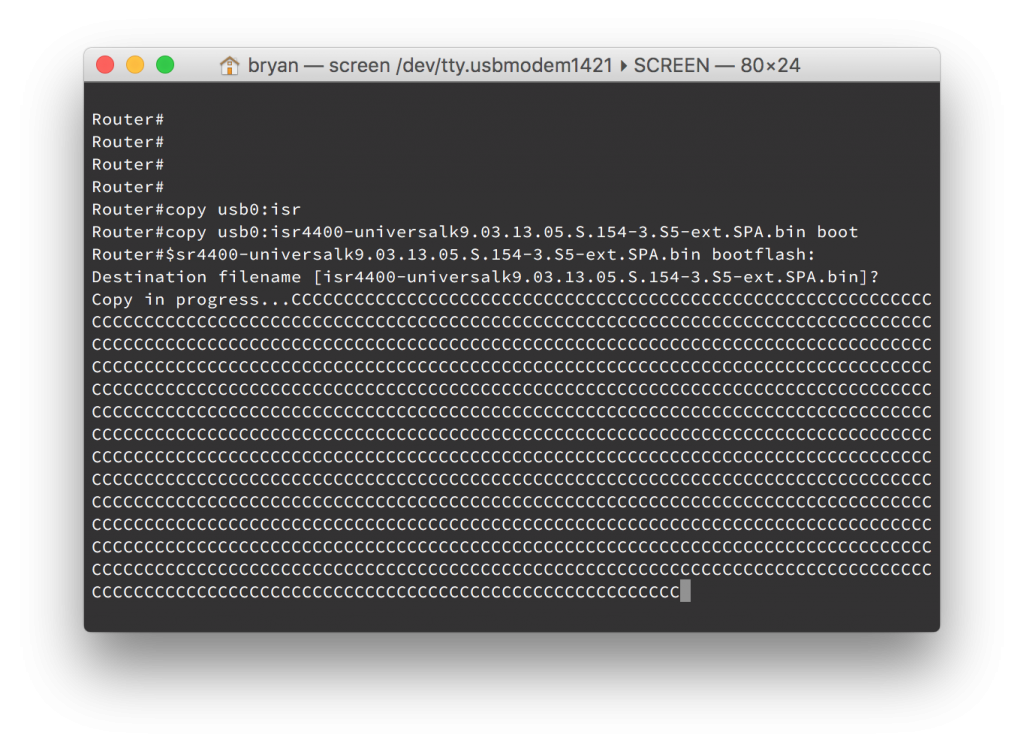Cisco Copy From Usb To Flash
Feb 27, 2015 Hi all. Passed my CCNA a couple of weeks ago 960 points:-) Got myself a new job and I need advice on how to load configuration files from my usb stick onto a Cisco. Get a USB flash disk drive and format it using the Cisco router. ROUTER#format usbflash0: ROUTER#show usbflash0: 4. Take out the USB flash disk and copy the following files on it. ROMMON upgrade to support booting using USB Flash drive – C1841RM2.srec.123-8r.T9. Cisco IOS image – c1841-ipbase-mz.124-6.T1.bin 5.
So I decided to upgrade a 2960XR stack via flash instead of TFTP mostly just because I could. What I wasn’t prepared for is how incredibly slow it went, and of course it broke. While it was sitting there crawling, I started searching around online looking for similar stories of this to see if hopefully it’s just slow, and wasn’t in the process of bricking my switch. I found no stories of slow usbflash copies, so that made me more nervous. I could still ssh into the management IP and things seemed okay, but a dir against flash2: (the copy target) hung, making me even more nervous.
In any case, the only thing I could find solace in was the fact that the “C’s” that were showing up to give me my copy progress continued to appear. Hopefully this meant my switch was simply copying the image very slowly and wasn’t corrupting itself. Finally, 30 minutes in, the new image was copied:
swh-1#copy usbflash02:c2960x-universalk9-mz.152-2.E5.bin flash2:
Destination filename [c2960x-universalk9-mz.152-2.E5.bin]?
Copy in progress…CCCCCCCCCCCCCCCCCCCCCCCCCCCCCCCCCCCCCCCCCCCCCCCCCCCCCCCCCCCCCCCCCCCCCCCCCCCCCC
5095424 bytes copied in 1832.387 secs (2781 bytes/sec)
Although that number of bytes copied was cause for concern, given the source file was:

swh-1#dir usbflash02:c2960*
Directory of usbflash02:/c2960*
137 -rw- 21273600 Aug 16 2016 13:49:28 -04:00 c2960x-universalk9-mz.152-2.E5.bin
So why did my 21 MB file turn into 5 MB copied? Let’s md5sum it:
Cisco Usb Format

#verify /md5 flash2:/c2960x-universalk9-mz.152-2.E5.bin
………………………………………………………………………………………………………………………………………………………………………………………………………………………………………………………………………………………………………………………………………………………………………………………………………………………………………………………………………………………………………………………………………………………………………………………………………………………………………………………………………………………………………………………………………………………………………………………………………………………………………………………………………………………………………………………………………………………………………………………………………………………………………………………………………………………………………………………………………………..Done!
verify /md5 (flash2:/c2960x-universalk9-mz.152-2.E5.bin) = 046712f3a4e8bed28882b870b62aa09f
Yep, that’s a problem given Cisco’s website says:
| Description: | UNIVERSAL |
| Release: | 15.2.2E5 |
| Release Date: | 07/Jun/2016 |
| File Name: | c2960x-universalk9-mz.152-2.E5.bin |
| Min Memory: | DRAM 128 MB Flash 64 MB |
| Size: | 20.29 MB (21273600 bytes) |
| MD5 Checksum: | 651c418f53629343babafa2e36c44a75 |
So I try a verify /md5 usbflash02:/c2960x-universalk9-mz.152-2.E5.bin and that’s also crawling like the copy was. Not wanting to waste 30 minutes, let’s break out and format this thing:
swh-1#format usbflash02:
Format operation may take a while. Continue? [confirm]y
Format operation will destroy all data in “usbflash02:”. Continue? [confirm]y
Format: All system sectors written. OK…
Format: Total sectors in formatted partition: 518528
Format: Total bytes in formatted partition: 265486336
Format: Operation completed successfully.
Format of usbflash02 complete
Cisco 1841 Copy Usb To Flash
So I recopy the image to the drive, md5sum it on my Mac, looks good, completes quickly, put it back in the switch, run verify against it again, and it spits out dots at a far faster rate, but then slows down after about 1/2 a window’s worth. I wait, and wait:
swh-1#verify /md5 usbflash02:c2960x-universalk9-mz.152-2.E5.bin
……………………………………………………………………………………….
Cisco Copy From Usb To Flash Drive
I give up at ten minutes and yank the drive out. If you saw the number of dots earlier for what was a 5 MB incomplete file, I suspect this thing had a long time to go.
Guess I’ll just do it the old way…. well not the super old way (TFTP), I used SCP instead; link to article on doing that.